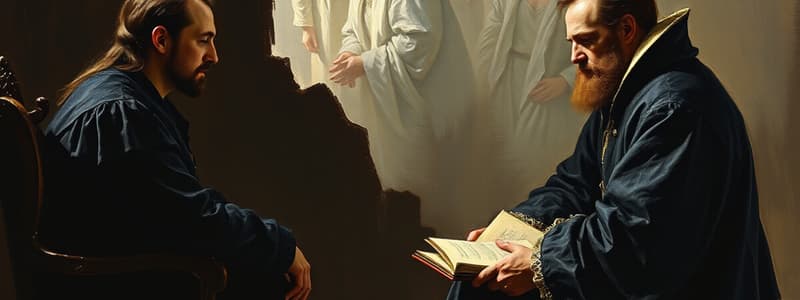Podcast
Questions and Answers
How does Macbeth's perception of guilt change throughout the play?
How does Macbeth's perception of guilt change throughout the play?
- He never feels any guilt after committing the murder.
- He initially feels guilt but gradually becomes desensitized to it. (correct)
- He becomes increasingly remorseful after each murder.
- He overcomes his guilt through rationalization and philosophical reasoning.
What event symbolizes Lady Macbeth's deepening guilt?
What event symbolizes Lady Macbeth's deepening guilt?
- Her hallucination of Banquo's ghost.
- Her defiant speeches rejecting any feelings of remorse.
- Her conversation with Macbeth about their plans.
- Her sleepwalking and the attempt to wash away blood from her hands. (correct)
Which moment best represents Macbeth’s hallucinations tied to his guilt?
Which moment best represents Macbeth’s hallucinations tied to his guilt?
- His vision of Lady Macbeth during her descent into madness.
- His encounter with Malcolm after Duncan's murder.
- His reflections on the witches' prophecies.
- Seeing the bloody dagger leading him to Duncan's chamber. (correct)
What ultimately happens to Lady Macbeth due to her guilt?
What ultimately happens to Lady Macbeth due to her guilt?
What does Banquo's ghost symbolize in Macbeth's experience of guilt?
What does Banquo's ghost symbolize in Macbeth's experience of guilt?
What significant change occurs in Lady Macbeth's character as a result of her guilt?
What significant change occurs in Lady Macbeth's character as a result of her guilt?
What is the initial reaction of Macbeth to his guilt after Duncan's murder?
What is the initial reaction of Macbeth to his guilt after Duncan's murder?
Which aspect of Lady Macbeth's behavior reflects her escalating guilt?
Which aspect of Lady Macbeth's behavior reflects her escalating guilt?
How does Macbeth's perception of guilt evolve throughout the play?
How does Macbeth's perception of guilt evolve throughout the play?
What does Lady Macbeth's sleepwalking indicate about her state of mind?
What does Lady Macbeth's sleepwalking indicate about her state of mind?
Which event best illustrates the consequences of Macbeth's actions on his mental state?
Which event best illustrates the consequences of Macbeth's actions on his mental state?
What ultimate fate does Lady Macbeth meet as a result of her overwhelming guilt?
What ultimate fate does Lady Macbeth meet as a result of her overwhelming guilt?
How does Macbeth's initial reaction to his guilt differ from his later behavior?
How does Macbeth's initial reaction to his guilt differ from his later behavior?
Which of the following moments best illustrates Lady Macbeth's struggle with guilt?
Which of the following moments best illustrates Lady Macbeth's struggle with guilt?
What does Macbeth's vision of the bloody dagger symbolize in relation to his guilt?
What does Macbeth's vision of the bloody dagger symbolize in relation to his guilt?
What effect does guilt have on Lady Macbeth as the play progresses?
What effect does guilt have on Lady Macbeth as the play progresses?
Which event marks a significant turning point in Macbeth's mental state regarding his guilt?
Which event marks a significant turning point in Macbeth's mental state regarding his guilt?
In what way does guilt manifest in Macbeth's behavior later in the play?
In what way does guilt manifest in Macbeth's behavior later in the play?




